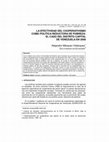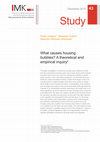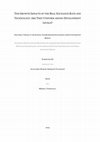Papers by Alejandro Márquez-Velázquez
Cuadernos de Economía, Dec 15, 2023

Political Economy: Structure & Scope of Government eJournal, 2012
Con el objetivo de evaluar la efectividad del Gobierno para transmitir los conocimientos basicos ... more Con el objetivo de evaluar la efectividad del Gobierno para transmitir los conocimientos basicos sobre el cooperativismo al grupo objetivo del plan de desarrollo 2001-2007 y saber si la calidad del conocimiento sobre el cooperativismo entre cooperativistas fue un factor importante para que los asociados pobres pudieran salir de la pobreza, se evaluo el conocimiento sobre el cooperativismo que tenia una muestra de trabajadores informales pobres y otra de cooperativistas en el Distrito Capital en 2006. El muestreo realizado para encuestar a los trabajadores informales pobres fue del tipo accidental, mientras que el muestreo de los cooperativistas fue probabilistico. La muestra de trabajadores informales mostro un bajo conocimiento sobre el cooperativismo, mientras que la de cooperativistas mostro un elevado conocimiento. Sin embargo, se encontro que el poder reductor de pobreza del cooperativismo dentro de la muestra de cooperativistas fue bajo.In order to assess the government’s effe...

Development Southern Africa, 2013
This paper analyses the factors that reduce the gold sector's contribution to the Tanzanian g... more This paper analyses the factors that reduce the gold sector's contribution to the Tanzanian government's revenue. Tanzania is among Africa's largest gold exporters. Yet ordinary Tanzanians have seen little benefit from this. This is partly because the government has enacted tax laws that are, as we shall see, overly favourable to multinational mining companies, and partly because of the same companies' business practices. Critics argue that the government fails to capture a substantial amount of state revenue as a result of low royalty rates, unpaid corporate taxes and tax evasion by major gold mine operators. This paper argues that the Tanzanian government should try to increase its share of revenues by taxation based on revenues, increasing its auditing skills and its involvement in mining, as well as by increasing the transparency of contracts and limiting the discretionary power of policy-makers in negotiating contracts.
Vierteljahrshefte zur Wirtschaftsforschung, 2016
Die Dokumente auf EconStor dürfen zu eigenen wissenschaftlichen Zwecken und zum Privatgebrauch ge... more Die Dokumente auf EconStor dürfen zu eigenen wissenschaftlichen Zwecken und zum Privatgebrauch gespeichert und kopiert werden.
Vierteljahrshefte zur Wirtschaftsforschung, 2016
Aus Politik und Zeitgeschichte (38–39) Venezuela, 2019

The paper investigates in how far lax monetary policy (defined as deviations from prescriptive mo... more The paper investigates in how far lax monetary policy (defined as deviations from prescriptive monetary policy rules or past trends) and/or financial innovation can be seen as a cause for housing price bubbles in industrialized countries. From a theoretical perspective, it is found that there are hardly any clearly formulated economic models which assign a role to lax
monetary policy in bubble formation while there are a number of models which assign a role to financial innovation or liberalization. In the empirical part, the paper first presents cross-country-time-series SUR regressions for a sample of 16 industrialized countries. According to the results, there is no
robust significant role for the relevance of loose monetary policy, measured by deviations from the Taylor rule. Instead, deviations from the past trend of the real policy rate affect housing prices, but the size of the effect depends on the regulation and development of the financial sector. In a third step, three case studies of the United States, Austria and the United Kingdom are presented, representing countries which have experienced a) lax monetary policy and a bubble b) lax monetary policy without a bubble and c) no deviation from the Taylor rule and a bubble. The case studies hint that specific changes in regulations played a role for the emergence or absence of bubbles, yet these regulations might not be appropriately covered by standard quantitative indicators for financial market (de-)regulation.
Books by Alejandro Márquez-Velázquez

This research aims at reassessing the impact of real exchange rate undervaluation and technologic... more This research aims at reassessing the impact of real exchange rate undervaluation and technological capabilities on the growth performance of countries, in the context of their economic development path. For this purpose the main results of the empirical literature concerned with the growth impacts in developing countries of, on the one hand, real exchange rate undervaluation and technological capabilities, on the other hand, will be reassessed. A literature review of these bodies of knowledge was undertaken with the goal to reveal the need to simultaneously consider both variables as growth drivers and to test whether their growth impact is similar at different development levels. The main argument of this dissertation is that in order for developing countries to sustain a high growth path, greater attention should be paid to their development levels when implementing macroeconomic and technological policies. It is therefore argued that keeping an undervalued real exchange rate will be more important for improving the growth perspectives of developing countries with a rather low income level. Given their generally low level of technological capabilities, such countries will have to rely more on keeping a competitive or undervalued real exchange rate to incentive the development of low-technology manufacturing sectors, which are very sensitive to the cost-competitiveness of countries, ceteris paribus. Furthermore, for the case of higher income developing countries, the so-called emerging markets, it is argued that high levels of growth will be sustained if governments can effectively promote the development of mid- and high- technology exporting sectors, which are long-term growth drivers and are highly dependent on the technological capability of a country. Empirical results clearly show that real undervaluation is more important a growth driver for developing countries at low income levels than for emerging markets. Nevertheless, the evidence is less clear when it comes to the relative importance of technological capabilities in emerging markets.
Essays by Alejandro Márquez-Velázquez
Seit 2012 wütet in Venezuela eine Wirtschaftskrise. Die Hyperinflation entwertet die Währung im Z... more Seit 2012 wütet in Venezuela eine Wirtschaftskrise. Die Hyperinflation entwertet die Währung im Zeitraffer. Können wiederholte Erhöhungen des Mindestlohns den Sturz der Kaufkraft stoppen?
Drafts by Alejandro Márquez-Velázquez
Discussion paper / School of Business & Economics Freie Universität Berlin, 2019
The resource curse literature’s main lesson is that developing and natural resourcerich countries... more The resource curse literature’s main lesson is that developing and natural resourcerich countries should save most of their oil windfalls in foreign currency. Moreover, the political cycle literature’s recent contributions predict stronger cycles in these countries. This paper investigates how political cycles might explain low oil windfall savings. Using Venezuela’s case, the paper argues that power concentration during periods of oil price explosiveness leads to increased public investment in prestige projects aimed at increasing the incumbent’s – or his party’s – re-election probabilities. The article backs the argument analyzing the Chavista democratic period of 1999- 2016. It also identifies parallels with Venezuela’s 1970-1988 period.









Uploads
Papers by Alejandro Márquez-Velázquez
monetary policy in bubble formation while there are a number of models which assign a role to financial innovation or liberalization. In the empirical part, the paper first presents cross-country-time-series SUR regressions for a sample of 16 industrialized countries. According to the results, there is no
robust significant role for the relevance of loose monetary policy, measured by deviations from the Taylor rule. Instead, deviations from the past trend of the real policy rate affect housing prices, but the size of the effect depends on the regulation and development of the financial sector. In a third step, three case studies of the United States, Austria and the United Kingdom are presented, representing countries which have experienced a) lax monetary policy and a bubble b) lax monetary policy without a bubble and c) no deviation from the Taylor rule and a bubble. The case studies hint that specific changes in regulations played a role for the emergence or absence of bubbles, yet these regulations might not be appropriately covered by standard quantitative indicators for financial market (de-)regulation.
Books by Alejandro Márquez-Velázquez
Essays by Alejandro Márquez-Velázquez
Drafts by Alejandro Márquez-Velázquez
monetary policy in bubble formation while there are a number of models which assign a role to financial innovation or liberalization. In the empirical part, the paper first presents cross-country-time-series SUR regressions for a sample of 16 industrialized countries. According to the results, there is no
robust significant role for the relevance of loose monetary policy, measured by deviations from the Taylor rule. Instead, deviations from the past trend of the real policy rate affect housing prices, but the size of the effect depends on the regulation and development of the financial sector. In a third step, three case studies of the United States, Austria and the United Kingdom are presented, representing countries which have experienced a) lax monetary policy and a bubble b) lax monetary policy without a bubble and c) no deviation from the Taylor rule and a bubble. The case studies hint that specific changes in regulations played a role for the emergence or absence of bubbles, yet these regulations might not be appropriately covered by standard quantitative indicators for financial market (de-)regulation.